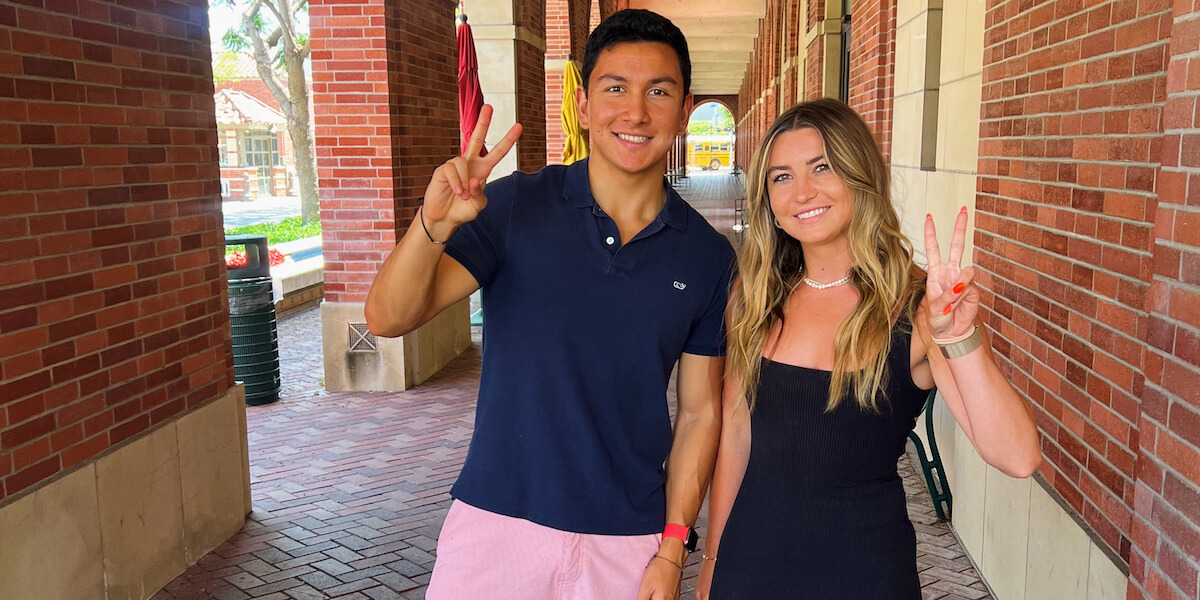
Brave co-founders Kian Abrishami and Taylor Vangrin (Photo/Courtesy of Taylor Vangrin)
Kian Abrishami felt disgusted.
At a USC dorm party a couple years ago, he saw a male student pull a drunken young woman to the couch. She tried to free herself from his grasp, but he managed to take her down. As she fell beneath the man’s weight, the woman reached out to a nearby friend who had just turned the other way.
Thankfully, this all had happened in public, Abrishami thought. But what if it hadn’t? What if the overly aggressive man had forced the semi-incapacitated women into a dark corner or a vacant bedroom? Would anyone have come to her defense or even have known she was in danger?
Sexual assault is rampant on college campuses. According to a 2015 survey of women seniors commissioned by the Association of American Universities, 27.2% of respondents said they had been sexually assaulted when incapacitated by alcohol or drugs since entering college. Additionally, nearly 17% of male college students are sexually assaulted, the National Sexual Violence Resource Center said.
Abrishami, a USC Viterbi senior majoring in biomedical engineering, would like to see those numbers plummet. Preventing sexual assault is of paramount importance to him – and personal. Years before, a much-older man had raped his 16-year-old friend at camp, causing her untold mental anguish. Other close friends have also been violated. In some cases, the victims declined to contact the police because they were minors and had been under the influence at the time of their attacks and feared getting in trouble with the law.
Abrishami wondered if there was anything he could do make people safer on campus. Tapping into his “systems, problem-solving mindset,” he decided to create a bracelet that could be easily activated to send a distress signal, along with a map of the sender’s location, to a friend’s phone at a large gathering or crowded bar. That idea became the basis of Brave, a new USC Viterbi-led startup and the developer of the BraveBand bracelet.
“We’re trying to prevent all the dangers that could come from being intoxicated and underage at a party, including sexual violence,” said Abrishami, Brave’s cofounder, chief executive and chief technology officer. “All students need a way to stay connected and to instantly notify their friends any time they feel vulnerable.”
The BraveBand difference
Abrishami imagines a different version of that aforementioned dorm party — one where the young woman and her friends had been wearing BraveBand bracelets. When the man makes unwanted advances, the young woman taps her bracelet twice. Doing so sends a signal from her smartphone to her friends’ phones, causing their BraveBands to vibrate and alerting them that she is in danger. Her friends also receive an Apple Map location pin on their phones, allowing them to quickly find her and intervene.
“If you wear a BraveBand bracelet, you’re never alone,” Abrishami said.
The Brave team is developing a BraveBand prototype that they expect to complete in the next six months. Eventually, they hope that the Brave app could be directly downloaded onto an Apple Watch and other devices.
Brave plans to market the BraveBand to universities, including student groups. Abrishami said, adding that schools could put the bracelets in welcome kits and pay a subscription fee for the app.
Hank Wasiak, a USC Marshall School of Business adjunct professor, marketing expert and company adviser, thinks that the startup is developing the right product at the right time. “I believe Brave can succeed because there is a definite market and a customer base for BraveBand and the opportunity to build a community that will coalesce around it,” he said. “Sexual assault, especially on college campuses, is an important issue that is top of mind with college students, their families and university administrators.”
Brave co-founder Taylor Vangrin, a senior at USC Marshall, serves as the startup’s chief marketing officer and chief operating officer. She stressed that Brave is more than just a company that makes bracelets. Through Instagram, YouTube and other social media channels, as well as podcasts, the company hopes to “promote community, a safe space for people to discuss sexual assault and remove the stigma from victims,” she said.
A home at USC
Abrishami said he cannot think of a better place for a student to build a business than at USC. Brave has benefitted greatly from participating in USC’s Marshall Incubator, receiving helpful tips, insights and encouragement from business professors, many of whom have served as executives in major corporations.
Additionally, Abrishami said his USC Viterbi education has given him the tools to code and oversee the technological development of the Brave app. Equally important, he and Vangrin plan to leverage the famed USC network to meet with angel investors and venture capitalists to solicit support for their startup.
“I’m incredibly happy here at USC,” said Abrishami, who transferred to Troy two years ago from Lehigh University. “USC was always a dream school of mine, and the experience has been priceless.”
.
Published on September 12th, 2023
Last updated on September 12th, 2023











